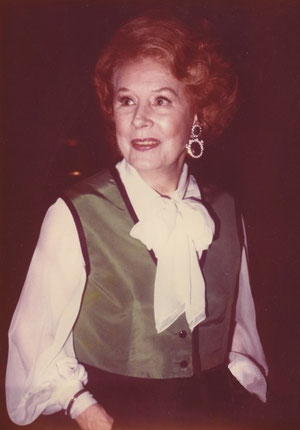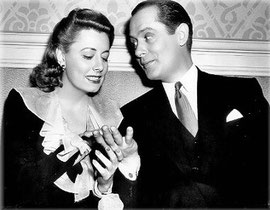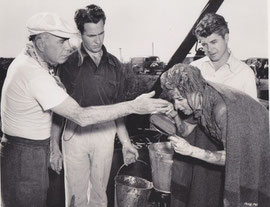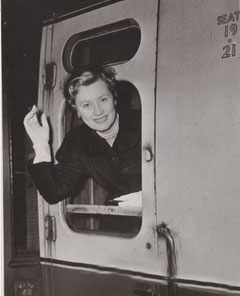A Visit With Irene Dunne
An Exclusive Interview By Contributing Editor James Bawden

HOLLYWOOD - The streets in the rolling Holmby Hills section of Beverly Hills twist and turn through the lush foliage of beautiful estates.
Here are the great houses of the proudest Hollywood stars. Dense bushes and well manicured lawns highlight the white colonial mansions and the sprawling ranch houses.
The cobbled streets open onto the driveway of a miniature French chateau hidden from the road by magnolia trees and the sprawling ranch houses.
To the side is a mammoth garage. On the doormat is a big "G" sign. A doorman answers the ring, smiles and guides you into a intimate study with a magnificent view of the gardens. The furniture is richly upholstered and the walls book-lined. The center of attention is an oil portrait of a strikingly handsome woman dressed in black.
This is the home of a person of prominence and taste. Elegance without ostentation. Everything it's in his place, the quietness only broken by the chiming of a clock.
Suddenly she's sweeping into the room and there's the shock of recognition. She stands defiantly under the portrait as if to underline the obvious - time has almost stood still.
"Now how was that for a movie star entrance?" asks Irene Dunne trying to suppress the laughter. "Oh I do hate to do that to people but it's so much fun. Or did you expect them to wheel me in?"
She was dressed in a simple Jean Louis powder blue pantsuit with pearl earrings. Her russet hair was upswept and bouffant and as she joked she tittered the same way she used to do in movies. She's still as uniquely beautiful as ever. There's that famous patrician nose, the cleft in the chin, the slender figure of a Vogue model.
"You know I don't give interviews anymore," she admonishes, trying to look stern. "But I liked the sound of your voice over the phone. And here we are sitting inside on such a nice summer day."
She most certainly doesn't consider herself retired, she emphasizes. "It's just that I don't act anymore if that makes sense. My brother asked if I had stopped smoking and I said 'No, but I'm not smoking now.' You see I found I didn't have to act to be happy. There was one year I did five pictures and I think of all the rewarding other things I could have been accomplishing."
And then there's the example of some of her contemporaries in film roles that have them dressing up in fright wigs and running around with axes. "I think of them and feel very sad indeed. That's the kind of stuff you are offered today. Scripts that have you mixed up with young men. I find them utterly revolting. Of course WE never had to do nude scenes. I'm glad, too, because I'm susceptible to pneumonia."
Irene Dunne acts the same way as she did as a star. She is honest, witty and wistful. Her career was one of the few which fulfilled all possibilities; and rather than overstay her welcome she left for other fields.
She works three days a week keeping up with the dealings of her corporation which has extensive real estate holdings througout southern California. "My brother Charles comes over and we plug away. It's not General Motors but we get by. My husband (Dr. Francis Griffin) worked with my agent (Charlie Feldman) on my career. When he died I took over as president of the company and it's as exciting as any picture I've ever been in."
She's involved in numerous charities which take time and there are visits from her grandchildren who live nearby. "I'm working harder than ever and there are days I feel bushed. But I'm not a little old lady living with her memories. True I live here alone but we built this house 40 years ago and I'd hate to leave. I've grown attached to it."
On her days off she golfs a bit, visits best friends ("I was just on the phone with Loretta Young"), even goes to the latest movies. "I went to see THE OMEN the other day with a friend. The teenagers in the crowd were throwing things and running up and down the aisles and switching seats. I thought what would happen if the caught one of my old pictures."

Irene Dunne always portrayed the lady in her films and she's rather dismayed by some of the present day celluloid trends. She liked MIDNIGHT COWBOY "for the acting technique of that little chap, what's his name? Dustin Hoffman, oh yes. But friends invited me to a private screening of EMMANUELLE and said I'd learn a few things. But I know all the swear words. I just don't use them. So I declined." Now she's laughing again. "There are worse things in life than being called a lady!"
"Cary Grant keeps saying I was the best smelling actress he ever worked with. I can't explain how he got onto that except I did have a distinct cologne. But that's why there are so few women stars today. Pornography has taken away the mystery. Now I was schooled in a convent so I act in a certain way. I'll leave the swearing to the Jane Fondas." And how does she feel today's actresses smell? "I'd say sweaty."
On the set of her filme Dunne was dubbed The Iron Maiden for her strong will - a title she says she should reserve for her autobiography. "I always demanded respect. I came prepared and expected others to do the same. I did all my fighting before the film started. I fought for the best director, the best lighting man.I was always conscious of how I looked. I had great cameramen like Rudolph Mate and Hal Mohr. They'd take an hour to light the proper closeup of me. My poor understudy would get quite hot standing under those lights!"
Dunne never had her command of leading men but she always picked her director. "I had George Stevens and Leo McCarey who worked very slowly. They'd putter for hours over a scene, even a line. You could never do that today or you'd go broke. We'd preview a picture and then go back for retakes to touch it up a little."
The Dunne magic generally worked. She won five Oscar nominations over her career although she never got the prize because she worked for the smaller studios with the less muscle in marshalling the votes. Is she disappointed that she was always Oscar's bridesmaid? "I never thought I'd win except for THE WHITE CLIFFS OF DOVER because Hedda (Hopper) said so in her column. And that was the year I never even got a nomination. After all Greta Garbo didn't win one either.
In fact she never met Garbo until last year. A picnic had been arranged at Brian Aherne's beach home and as the car pulled into the driveway Irene looked out "and saw Greta. She was trying desperately to get into the front because she didn't want to sit with me all the way down. Well, we did sit together and she was charming. She is the shyest little thing around. We were sitting down to dinner when Greer Garson popped over and Greta clammed up again. She'd been conditioned to talk to me but not to them, you see. At the end of the day I went and picked some roses for her and she hugged me and was gone."
Irene Dunne's reputation is fast approaching the legendary status. A few years ago the Los Angeles County Museum of Art held a tribute and screened her ten best films, turning away thousands every night. Last year the Los Angeles Film Exposition rented the massive Shubert theatre for five hours of clips from her movies and the ovation she received in the end "made my knees buckle."
"Years ago the public used to hound me but now I can go shopping in peace. The picture postcard people printed a card of our house and address years ago for the tourists but they made a mistake and took the next house. I'd peek out my bathroom window at all the people trampling the lawns next door and feel sorry for the neighbors."

Irene has a charming vagueness about the early details of her life. She was born in Louisville, Kentucky in 1904, the daughter of a ship inspector and a pianist. Her father died when she was 12 and she moved with her mother and brother to Madison, Indiana, to be brought up by grandparents. Her good looks and lovely soprano won her a scholarship at the Chicago Musical College and a diploma in 1920. Irene didn't think her voice was strong enough for opera but instead decided to storm Broadway. She was Peggy Wood's understudy in "The Clinging Vine" in 1923 and when the star developed laryngitis Irene bounded onstage in the best show-must-go-on tradition. From there Flo Ziegfeld put her into the touring company of SHOW BOAT.
In 1928 Irene decided to retire after marrying dentist Francis Griffin. Just then talkies came in and she was offered a contract from RKO Pictures. On a lark she accepted and was so unsure about her new status she continued to commute from New York for each picture.
Her debut was a now forgotten film called LEATHERNECKING. But for her second, CIMMARON, she was selected out of a field of 18 finalists to co-star with Richard Dix as strong-willed Sabra Cravat. The picture became the only western ever to win an Oscar as best film of the year and Irene copped her first Academy Award nomination.
Thereafter she was mired in women's pictures: CONSOLATION MARRIAGE, THIS MAN IS MINE, IF I WERE FREE, SECRET OF MADAME BLANCHE. "They were all trash but very popular at the time. I wept buckets. I cried enough to fill several swimming pools."
She became a superstar with BACK STREET co-starring John Boles and MAGNIFICENT OBSESSION with a youngster she'd noticed on the lot called Spangler Arlington Brough. He decided to call himself Robert Taylor. And there was a period piece with a delightful new import from Britain. Irene had gone through her costume tests and was on the sound stage ready to begin shooting when an RKO executive rushed in and said the picture was cancelled because the young man was not considered big enough at the box office.
"And that's how I did NOT make a picture with Laurence Olivier," she sighs.
RKO was in such desperate straits during the Depression Irene was asked to take a salary cut in exchange for a percentage of the profits. She agreed "and the picture, THE SILVER CORD, was such a hit I made back my salary several times."
With her contract up, Irene became the first superstar to freelance. She signed limited deals at several studios so she could pick and choose her material. At Warner Brothers she sang such Jerome Kern standards as "Why Was I Born" in SWEET ADELINE. She returned to RKO topbilled over Fred Astaire and Ginger Rogers for ROBERTA and such songs as "Smoke Gets In Your Eyes." Over at Universal she made a stunning Magnolia in Show Boat co-starring Helen Morgan and Paul Robeson.

Harry Cohn at Columbia signed her for comedies but Irene took one look at the script of THEODORA GOES WILD and boarded a slow boat to Europe with her husband hoping it would all go away. The director was Richard Boleslawski, a Moscow Art Theatre graduate who spoke fractured English and was on loan from MGM as punishment. "When I got back the script was still there and I muddled through." So much so that the screwball antics of genteel Irene writing a scorching best seller about small town life won her a second Oscar bid.
The next year she did THE AWFUL TRUTH, Cary Grant's first venture into comedy. "The director was Leo McCarey who threw the script away and had us ad lib. He'd sit in a corner all day thinking up jokes and then film the scene. He asked me if I could play the piano and I said 'A little.'Then he asked the other star Ralph Bellamy if he could sing and Ralph said 'no.'So he put us together on a rendition of 'Home On The Range.'Cary said later I had the best timing of any actress he worked with."
Irene is on her feet showing how she impersonated a brazen hussy in the final reels by flouncing around with a long scarf. She was good enough for another Oscar bid and went on to make two more with Grant (PENNY SERENADE and MY FAVORITE WIFE). "What can I tell you about Cary? He was an awfully amusing fellow on the set. He was filled with quips and jokes. We were a perfect team."
She was also a perfect team with Charles Boyer through three films. "He was the complete professional. So smooth. Such understatement. We complimented each other. A great, underestimated actor. I never see him now because he lives in France." One of their films, the sensitive LOVE AFFAIR would be remade as AN AFFAIR TO REMEMBER.

Eventually Irene worked at all the studios for top salaries. The one time she did not get the first billing was in A GUY NAMED JOE with Spencer Tracy for MGM. Tracy said it was ladies first in lifeboats but not on the screen. "The first few days Spence was VERY difficult testing me out. He badgered the director, Vic Fleming and behaved badly until I told him to settle down. And he did. He'd come to my dressing room for tea and we'd talk about our children. And he was very loyal." So much so that when co-star Van Johnson was injured in a car crash Tracy insisted production shot down until Johnson recuperated.
Meanwhile Irene was rushed into THE WHITE CLIFFS OF DOVER and when Johnson was well, she traveled back and forth between two pictures. "I always believed in my characters. I lived them. So being two different people in one day unnerved me to no end. And yet I think THE WHITE CLIFFS OF DOVER one of my best films."
Irene says she was never the best judge of what was right for her. She did not want to do ANNA AND THE KING OF SIAM with Rex Harrison yet it was a smash. She was cool to LIFE WITH FATHER but the public loved it.
After I REMEMBER MAMA and another Oscar nomination she tried her first character role as Queen Victoria in THE MUDLARK. "My fans hated me with that rubber mask on and all that padding. It was not a big success." She made one more, IT GROWS ON TREES, then went into television.

For a season she was the hostess of "Schlitz Playhouse of Stars" but "people didn't like to see me promoting beer." She guest-starred on other programs until 1965. In 1957 President Eisenhower appointed her a delegate to the 12th session of the United Nations. "When I asked him why, he said 'Irene, I'll be blunt. I need a woman and somebody from the West.' I did my best. For Thanksgiving I invited all the women delegates present. Well, an Indian woman sat across from me and couldn't eat the turkey or the cranberry sauce or the pumpkin pie and I thought, Oh my, what have I done?"
Irene's still a staunch Republican but she says "Extremism of the right or the left is dangerous. I believe in politeness and hard work. Friends asked me how I coped when my husband died. There were dark days but I have my faith. I cried in private. I'm not an exhibitionist. I had to carry on for my daughter and her family. It all depends on how you're brought up. I was brought up right."
The shadows were lengthening over the lawn as she curled up on the sofa. She laughed as she browsed through the stills I had brought along and suddently started singing very softly the song Kern had written especially for her in ROBERTA: "Lovely to look at/ Delightful to know/ And heaven to kiss..."
"My career was not the longest but I had a high batting average. Now Claudette Colbert lived next door and she'd finish a movie on Saturday - we worked Saturdays in those days - and begin wondering what she was doing Monday. I lacked that terrific ambition. I drifted into acting and drifted out. Acting is not everything. Living is."
She rang for her chauffeur Melvin to drive me back to the hotel - she could have said her hotel for she owns a piece of it.
"Now don't you dare call me normal," she admonished from the door. "I was never a Pollyanna. There was always a lot of Theodora in me."
(American Classic Screen, Sept./Oct. 1977)
 The Irene Dunne Site
The Irene Dunne Site